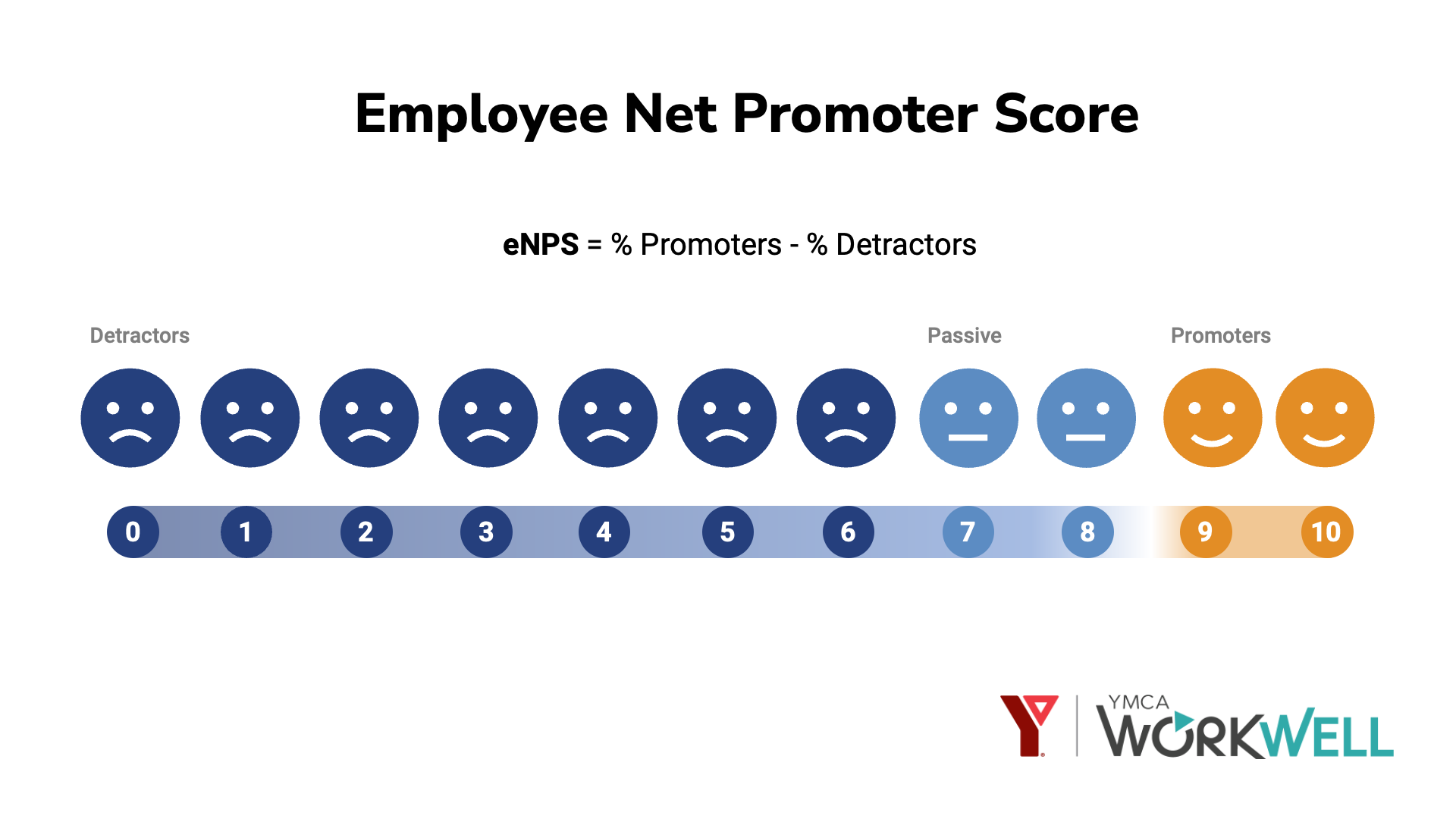If you’ve ever wondered “How happy are my employees, really?” or “Would they tell others to work here?”, you’re not alone.
Enter Employee Net Promoter Score (eNPS) — a simple but powerful way to get a pulse on how your team feels about their work. At YMCA WorkWell, it’s one of the most talked-about metrics in our Employee Insights Survey. But like most things in life and work, it’s more nuanced than it seems.
Let’s break it down.
What is Employee Net Promoter Score (eNPS)?
Employee Net Promoter Score is adapted from the original Net Promoter Score (NPS), a one-question metric developed by Fred Reichheld to gauge customer loyalty and satisfaction.
Instead of asking about products, eNPS was developed to turn the spotlight inward and measure employee satisfaction within an organization, asking:
“How likely are you to recommend your organization as a great place to work?”
Employees answer on a scale from 0 (not at all likely) to 10 (extremely likely). Based on their score, they’re grouped like this:
- Promoters (score 9-10): Loyal, engaged, and likely to sing your praises.
- Passives (score 7-8): Content, but not brand ambassadors.
- Detractors (score 0-6): Disengaged, and likely vocal about it.

To calculate eNPS, subtract the percentage of Detractors from the percentage of Promoters. This creates a score from -100 to +100, where a positive score indicates a higher number of promoters than detractors and a negative score indicates a higher number of detractors than promoters.
What is a Good eNPS?
Your employee experience is not the same as your customer experience. There are additional challenges and nuances, so what constitutes a "good" eNPS is different when it comes to your employees.
At YMCA WorkWell, we suggest the following scoring framework:
- Below 0 is concerning
- 0-20 is about average
- 20-40 is good
- 40+ is excellent
What eNPS Can Tell You (And What It Can't)
eNPS is fantastic for giving you a high-level view of employee sentiment — a quick pulse check. But let’s be clear: it’s just that. A pulse check. What it lacks is insights into why you score where you do. This is the disadvantage of any one-question metric - they can only tell you so much.
Think of it like your car’s check engine light. It tells you that there is an issue with your car and raises the alarm, but it doesn’t tell you what the issue actually is.
That’s why we never recommend using eNPS in isolation. On its own, it won’t tell you:
- Which parts of the employee experience need improvement
- Why certain teams score higher or lower
- What’s driving loyalty or dissatisfaction
From eNPS to Insight: Going Deeper With WorkWell Insights
To move beyond the check engine light, you need a full diagnostic. That's where we come in.
Our WorkWell Insights Survey goes deep - measuring 20 key drivers of organizational health, including quantitative data and employee stories. It helps leaders understand why their eNPS is what it is and what they can do to improve it.
For example:
- If your Sales team has a negative eNPS, we might find that workload is overwhelming or recognition is lacking.
- Meanwhile, an HR team with a high eNPS might be thriving under a culture of open feedback.
It’s not just about scores — it’s about stories.
Why Start Measuring eNPS Now?
In the community data from our recent Workplace Well-being Report, 52% of detractors were considering leaving their role in the next six months, compared to only 15% of passives and 6% of promoters.
Knowing your eNPS - and understanding what drives it - can help you:
- Spot trouble early
- Understand which teams need support
- Build targeted, data-informed retention strategies
The Bottom Line
eNPS is a great place to start. But it’s not the finish line.
When paired with deeper insights like our Employee Insights, it becomes a catalyst for action — not just a number on a dashboard. And when used consistently, it can transform how you measure, understand, and improve employee satisfaction.
Need help figuring out your eNPS or what it’s really telling you? Let’s chat.